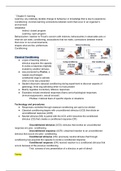Chapter6: Learning
Notes for the sixth chapter of the textbook Weiten, W. & McCann, D. (2019). Psychology: Themes and Variations. Fifth Canadian Edition. Nelson Education Ltd. as well as lecture notes for learning.
Livre connecté
- 2012
- 9781111354749
- Inconnu
École, étude et sujet
- Établissement
- Carleton University (CU )
- Cours
- Psychology
- Cours
- PSYC1001 - Introduction to Psychology I (PSYC1001)
Infos sur le Document
- Publié le
- March 28, 2019
- Nombre de pages
- 7
- Écrit en
- 2018/2019
- Type
- Class notes
- Professeur(s)
- Mathew sorley
- Contenu
- Chapter 6
Sujets
-
psychology
Document également disponible en groupe


